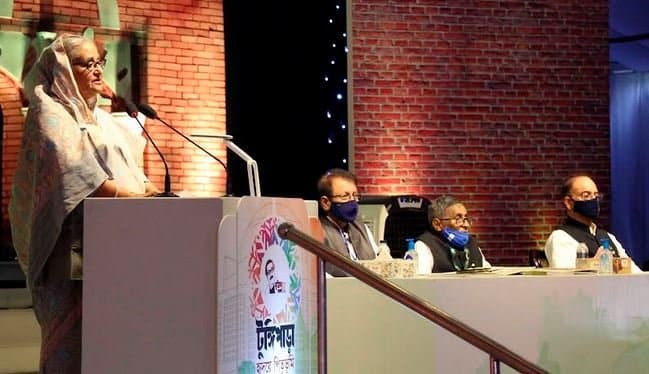Govt’s prime target to grow up children as good citizens: PM

Prime Minister Sheikh Hasina said the main goal of the government is to build the country’s children as good citizens following the ideals of Bangabandhu.
“Apart from paying tributes to Father of the Nation Bangabandhu Sheikh Mujibur Rahman on the National Children’s Day, the prime target of our government is to build the children as good citizens following the life and works of the great leader,” she said in a message on the eve of the 102nd birth anniversary of Bangabandhu and the National Children’s Day.
On the occasion, the premier extended her heartiest greetings to the countrymen including the children.
The theme of this year’s children day is “Commitment of Bangabandhu’s Birthday: Equal Rights for all Children”.
Sheikh Hasina said Bangabandhu Sheikh Mujib was born in the famous Sheikh Family in Tungipara village in Gopalganj district on 17 March 1920.
Bangabandhu was fearless, kind and benevolent since his childhood, she said, adding, “The leadership quality was observed in his personality from his school life. Gradually he emerged as the last refuge of
realizing Bangla’s rights”.
The main aim of the long political life of this world-renowned leader who had keen memory and farsighted vision was to liberate the Bengali nation from the chains of subjugation, the Prime Minister said.
The best Bangalee of the thousand-years led the struggle to establish the dignity of Bangla language, Sheikh Hasina said, adding that in 1948, on his proposal, Rashtrabhasha Sangram Parishad was formed in coordination with Bangladesh Chhatra League, Tamaddun Majlish and other student organizations.
On March 11, 1948, Bangabandhu was arrested while observing a strike to materialize the demand for recognition of Bangla as the state language and imprisoned for several times between 1948 and 1952, the premier said, adding that but he led the Language Movement from both in and out of the
jail.
During the final revolt of the student-people on February 21, 1952, Bangabandhu gave directions from jail, Sheikh Hasina said.
In continuation of the Language Movement, the premier said, Jukto-Front (United Front) election in 1954, the movement against military rule of Ayub Khan in 1958, the Education Movement in 1962, the Six-Point movement in 1966, the movement against Agartala Conspiracy Case in 1968, the Mass Upsurge in 1969, the General Elections in 1970 and the War of Liberation in 1971 were led by the undisputed leadership of Father of the Nation Bangabandhu Sheikh Mujibur Rahman.
The charismatic personality and influential leadership of Bangabandhu united all the freedom-aspiring Bangalees during the Liberation War, she said, adding, “As a result, we got an independent, sovereign Bangladesh. The entity of the Bangalee nation flourished”.
Bangabandhu was not only a leader of the Bangalees, but also the leader in establishing rights and emancipation of all oppressed, exploited and deprived people of the world, the premier said.
When Bangabandhu Sheikh Mujib paid attention in rebuilding the independent Bangladesh, Sheikh Hasina said, the defeated anti-liberation cliques assassinated the Father of the Nation along with most of his family members on 15 August, 1975.
Through this killing, the spirit of the Liberation War, the democratic progress and development of Bangladesh were stunned, she said, adding that the illegal military regimes later destroyed severely one of the best constitutions in the world and rehabilitated the anti-liberation forces, war criminals and reactionary forces.
“The people were deprived of rights of food and voting. The history of the great Liberation War was distorted. A black law titled ‘Indemnity Ordinance’ was enacted to prevent justice to the heinous killings in the history and give impunity to the killers,” the premier said.
After long 21 years, Awami League came to power in 1996 with the people’s mandate and repealed the black law and started the trial of Bangabandhu murder case, Sheikh Hasina said, adding that with the execution of the verdict of the trial, the nation got rid of the stigma.
Since 2009, the successive governments of Bangladesh Awami League have relentlessly been working to improve living standards of the people, the premier said, adding, in the meantime, Bangladesh has achieved outstanding socio-economic progress.
It has fulfilled the requirements for graduating from the least developed country to developing one, she said, adding that economic growth and literacy rate have been increased.
“We built the Digital Bangladesh. Trials of war criminals are going on and several verdicts have already been executed while the trial of four national leaders’ killing has also been completed. We have been
able to keep the country stable by eliminating the militancy and hartal culture,” Sheikh Hasina said.
Pointing out that villages are being transformed into towns, the premier said many mega projects, including 100 Economic Zones, 39 Hi-Tech Parks, Bangabandhu Satellite-2, deep seaport, Padma Bridge, LNG terminals, Expressways and Nuclear Power Plants, are being implemented.
“The country is moving forward. Today we have become a country with self- respect in the world holding our heads high. We are determined complete the unfinished work of the Father of the Nation by resisting all conspiracies of anti-liberation communal groups and anti-development and anti-democratic forces,” she said.
Since Bangabandhu Sheikh Mujib had immense affection for children, the Prime Minister said, the Awami League government had declared his birthday as the National Children’s Day in 1996.
On the occasion, Sheikh Hasina, prayed to Almighty Allah for the forgiveness of the departed soul of the Father of the Nation and wished the bright future of the children and adolescents, who are the
future leaders.





